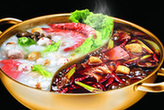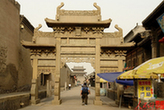The lower classics are about spirits. The lower Shibi is in charge of exorcising evil spirits, calling up spirits from those died unnaturally and purifying negative karma. When conducting religious rites, Shibi should talk of “Tie Jiang Shen (god of blacksmiths)”, “Shi Jiang Shen (god of stonemasons)”, “Mu Jiang Shen (god of carpenters)”, “Jian Zhu Shen (god of construction)” and “Niu Yang Shen (god of cattle and sheep)”. At the same time, they should wear short coats (or leopard skin), white skirts and golden-monkey-skin hats with three corners. Monkey’s paws and skulls are divine tools that help Shibi to meet the demands of the villagers.
“Cai Hong Hua (Step on A Red-hot Ploughshare)”
“Cai Hong Hua” (Source: http://www.chinesefolklore.com) |
Shibi has three unique skills: “Cai Hong Hua”, “Zuo Hong Guo (sit on a red-hot pan)” and “Ta Dao Shan (stamp on knives); they perform three major functions: drinking freshly boiled oil and spouting flames, washing face with ashes and picking up stones in the boiling oil.
“Cai Hong Hua” is a common method used by the lower Shibi to cure diseases and heal cuts. “Hong Hua” means “red-hot iron ploughshare”. Yu Yaoming, a scholar of the Qiang ethnic group, once wrote: “If one has a stomachache, heartache or swelling of the abdomen, he or she will ask Shibi to conduct “Cai Hong Hua”. Shibi will put an iron ploughshare into the fire and lick the ploughshare after it becomes red hot. Then, Shibi will step barefoot on it for three times and immediately stamp on the location of the disease. Such a process will be repeated for several times. After licking the ploughshare, Shibi could also temper it by dipping in water and let the patient drink the water. It is said that “Cai Hong Hua” usually proves effective.
Preservation of Shibi Culture
As the language spoken by the Qiang people has never been written down, it is Shibi who plays the most important role in spread the knowledge of history, culture, astronomy, geography, cultivation, grazing, hunting, construction, wedding and funeral ceremonies, medicine, music and dance. Shibi culture has been passed on only by word of mouth. It is said that if Shibi scriptures are completely translated into Mandarin, the translated version would be the longest epic in the world. In Shibi scriptures, four characters form a sentence, and two sentences form a stanza.





Why not rent a boyfriend, or girlfriend to please parents during the Spring Festival?